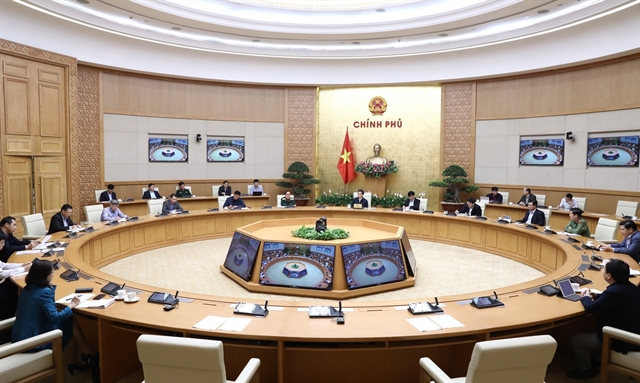 Society
Society

Việt Nam must continue its strong efforts to decisively prevent and cope with the COVID-19 epidemic which was spreading globally, said Deputy Prime Minister and head of the National Steering Committee for COVID-19 Prevention and Control Vũ Đức Đam yesterday.

|
| The National Steering Committee for COVID-19 Prevention and Control met yesterday in Hà Nội to discuss further measures to fight the epidemic. — VNA/VNS Photo Văn Điệp |
HÀ NỘI — Việt Nam must continue its strong efforts to decisively prevent and cope with the COVID-19 epidemic which was spreading globally, said Deputy Prime Minister and head of the National Steering Committee for COVID-19 Prevention and Control Vũ Đức Đam yesterday.
During a meeting, the committee’s members stated that the disease had been developing complicatedly on a global scale.
As of yesterday morning, the world had recorded nearly 170,000 infected cases in 154 countries and territories.
Việt Nam now has 57 infected cases, 17 of whom are foreigners.
Việt Nam needed watertight solutions to closely monitor foreign citizens entering Việt Nam, said the committee.
The committee discussed measures to co-ordinate more closely with relevant agencies to implement the Prime Minister’s guidance on mandatory medical declarations and quarantine for people arriving in Việt Nam from or passing through epidemic areas within 14 days, or those who showed clinical signs of the disease.
The committee yesterday sent an official letter to the ministries of National Defence, Public Security, Foreign Affairs and Transport, as well as People’s Committees nationwide about quarantine conditions for people arriving in Việt Nam.
The letter noted that many Vietnamese students, workers and migrants from COVID-19 infected areas including Schengen nations, the United Kingdom, China, South Korea and Iran would be arriving in Việt Nam in the coming days.
Watch our video on tourists' reactions to the Government's order to wear masks in public
The Ministry of Transport has been tasked with alerting relevant agencies of flight numbers and passenger information for those arriving from epidemic-hit areas so quarantine could be organised where necessary.
Airlines were instructed to inform passengers about regulations on disease prevention and control in Việt Nam.
The Ministry of National Defence takes the responsibility of setting up quarantine areas and transporting all people from or passing through COVID-19 epidemic countries to those areas.
The Ministry of Public Security will consider a plan to shorten the duration of immigration procedures to avoid overcrowding at airports.
The ministries of Health and Foreign Affairs were requested to closely monitor the epidemic's development around the world and report to the Prime Minister updated lists of countries and territories affected by COVID-19.
Efforts from grassroots levels
At the meeting, the committee agreed that local governments must strongly promote their roles in the fight against the pandemic.
COVID-19 prevention and control committees at commune and ward levels headed by People’s Committee’s chairmen with help from the police, medical workers and youngsters would take responsibility for going door-to-door to households to collect information on the health and travel of local people.
Where necessary, these groups will take on-site samples for testing from those who have clinical signs of the disease.
The Ministry of Information and Communication was assigned to set up IT working groups to assist grassroots-level committees in collecting and transmitting people’s health information.
Vietnamese citizens were encouraged to make medical declarations to help the health sector to sort out people’s health conditions such as people with background diseases.
Protective equipment
The committee also asked the Logistics Sub-committee to set up and carry out measures to ensure sufficient supplies of protective medical equipment as well as offering proper subsidies for the forces engaged directly in the epidemic fight.
The subcommittee in co-operation with the Việt Nam Father Front would collect donations from businesses and individuals to buy medical equipment and supplies for epidemic prevention and control activities.
Meanwhile, the health care sector would establish a mobile testing system and mobilise the private health sector to join in the fight.
Those who were asked to go into quarantine by health workers would have their tests and treatment paid for by the State Budget.
Foreigners would be given free tests the first time but would have to pay for their treatment fees. — VNS




